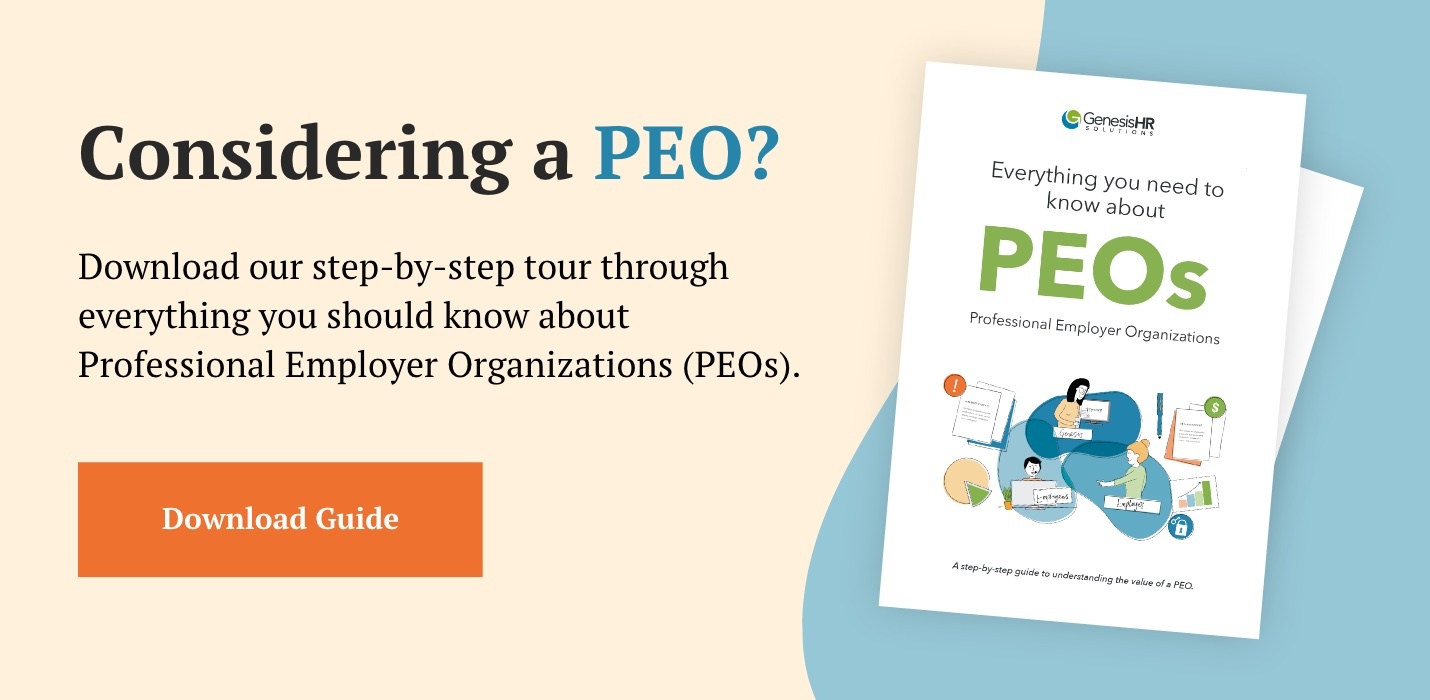- A professional employer organization (PEO) provides payroll administration and compliance support, as well as additional HR services.
- PEOs are distinctly different from administrative service offerings (ASOs), human resources outsourcing (HRO), and staffing companies. However, the term “employee leasing” is another way to describe a PEO agreement.
- This article is for small business owners who are trying to understand if a PEO is a good choice for partnership or if they should consider one of the other alternatives that exist in the HR space.
PEO. ASO. HRO. OMG!
If you’re confused by the acronyms and terms we use in the human resource world, you’re not alone! In this article, we’ll pick apart these acronyms (plus several other related terms) so it’s clear what they all mean, and point out how each of these alternative human resource services compares to PEO companies.
How PEO Companies Compare To 5 Alternatives
Professional Employer Organization (PEO): A Definition
According to NAPEO, “A professional employer organization (PEO) provides comprehensive HR solutions for small and mid-size businesses. Payroll, benefits, HR, tax administration, and regulatory compliance assistance are some of the many services PEO companies provide to growing businesses across the country.”
Partnering with PEO companies allows businesses of all sizes to outsource many of their human resource functions, share employment liability, and, oftentimes, gain economies of scale to bring an improved benefits package to employees. A PEO is an extension of your business and engages with your management team to address complex employee-related matters.
Learn more about what a PEO is and why your company needs one. Download Everything You Need To Know About PEOs!
PEO vs. ASO
An administrative service offering (ASO) is a service businesses use to outsource administrative functions, including employee benefits, payroll, HR management, workers compensation, and safety programs. With an ASO, your small business gets one partner that manages the vendors your business selects to work with.
The major differences between PEOs and ASOs are:
| ASO vs. PEO | |
|---|---|
| ASOs manage the 3rd party partners you choose. | PEOs select the 3rd-party partners that best fit the collective group of clients served. |
| ASOs don’t get volume pricing for benefits. | PEOs get volume pricing for benefits. |
- PEOs choose third-party partners and offer them to you; ASOs manage the third-party partners you choose.
- ASOs don’t get volume pricing for benefits; PEOs get volume pricing for benefits
- Both options manage insurance partners (but in different ways).
- PEOs have a stake in the employment relationship including compliance; ASOs don’t have any skin in the game.
You can read more about ASOs in our article ASO vs. PEO: What’s the difference?
PEO vs. HRO
| HRO vs. PEO | |
|---|---|
| HRO is subcontracting HR functions to an external supplier. | PEOs select the 3rd-party partners that best fit the collective group of clients served. |
| With HRO, you don’t get volume pricing for benefits. | PEOs get volume pricing for benefits. |
| The employer remains the “employer of record” | The PEO becomes the “employer of record” |
Human resources outsourcing (HRO) is the process of sub-contracting human resources functions to an external supplier. (Personnel Today)
HRO may also be referred to as BPO, or Business Process Outsourcing. According to Centripetal Consulting, it has “traditionally only been available to larger organizations; however, many outsourcers are bringing this model to the mid-market. Like an ASO, an employer remains the ‘employer of record’ in this type of arrangement.”
In this type of arrangement, HR outsourcing can be viewed as an entire function, and implies a speciality with years of experience.
The major differences between a PEO vs. an HRO are similar to those we discussed with ASOs; namely, when comparing PEO vs. ASO vs. HRO, the latter two deal with management of HR- and benefits-related options you choose on your own and don’t get guidance with. Companies who partner with a PEO have no need to also hire an ASO or HRO.
When comparing PEO vs. ASO vs. HRO, the latter two deal with management of HR- and benefits-related options you choose on your own and don’t get guidance with. Click To TweetPEO vs. Employee Leasing
| Employee Leasing vs. PEO | |
|---|---|
| PEO and employee leasing mean the same thing! |
Actually, the terms “PEO” and “employee leasing” mean the same thing! “Employee leasing” is a term the PEO industry used in the past. Now, it has been replaced by the term “PEO” to be more clear about the co-employment relationship companies like GenesisHR provide, and to avoid confusion it with the concept of temporary labor. PEOs do not find employees for your company—together we become joint or shared co-employers.
PEO vs. Staffing Companies
| Staffing Companies vs. PEO | |
|---|---|
| Staffing companies help companies find and hire employees by recruiting. | PEOs come into play at the time of employment and partners with employers from that point on. |
| Staffing companies don’t handle benefits or HR administration. | PEOs get volume pricing for benefits and handle all the burden of an HR function. |
Staffing companies, also called staffing firms or staffing agencies, help companies find and hire employees. In other words, they are recruiting firms, and help find job candidates for employers to interview.
Staffing companies work with organizations up to the time a position is filled, and are not engaged on the benefits side of employment. They don’t touch payroll, and their sole purpose is to help staff organizations. A PEO, on the other hand, comes into play at the time of employment and partners with employers from that point on. (Once an employee accepts employment, a PEO engagement begins.)
Businesses that work with staffing companies can and do also work alongside PEOs; the two services benefit employers at different points in the employee lifecycle.
PEO vs. Payroll Service Providers
| Payroll Service Providers vs. PEO | |
|---|---|
| Payroll service providers are hired only to process a company’s payroll. | PEOs have a payroll aspect, but payroll processing is just one of the many things PEOs do for clients. |
A payroll service provider is a third-party company hired to process a company’s payroll. Payroll service providers provide direct deposit or payroll checks; they also (in most cases) forward the tax payments to state and federal tax authorities. Payroll service providers may track PTO benefits (including time off, sick time, or vacation time) as well as offer timekeeping solutions for the purpose of collecting hours and submitting to payroll.
While the above accurately describes the traditional role of a payroll service provider, some payroll providers have begun to expand their services. Many are adding HR services, access to benefits, and more to lure (or keep) clients. Even some insurance brokers are offering HR services! Examples of payroll service providers include big-name companies such as ADP and Paychex, as well as a myriad of small or local options. It’s not difficult to find payroll service vendors.
Which option is best for you?
When you’re deciding how to outsource your HR administration, be sure to take into consideration each of these questions:
- First, identify and list the activities you’re struggling with that you would like to offload to a partner. Use that list to see how the solutions you’re considering line up with your needs. Understanding what functions you want to handle—vs. those you’d rather hand off to a partner—is the most important part of your decision.
- Look at the credentials of the partner you’re considering. Is the organization certified by a third party, like the IRS or ESAC? (At GenesisHR Solutions, we are proud to be both a Certified PEO and accredited by ESAC.)
- What is the experience of the team who would be handling your account? Look at their turnover rates, whether they’re a relationship-focused company, and how many years of experience they have in dealing with your areas of need. (GenesisHR Solutions’ renewal rates are above 97 percent per year—our customer retention rate is a testament to our stellar service and support.)
- Understand how your potential PEO or ASO partners select and manage their insurance vendors. For example, at GenesisHR, we’ve worked with our benefit partners for nearly a decade—these consistent relationships lend stability to you and your employees.
Contact us for more information about partnering with a small business PEO like GenesisHR.
Staffed by knowledgeable, experienced individuals, our PEO may be the most beneficial way to get HR support for your company. Let’s talk about how GenesisHR can help relieve your organization of the burden of HR, payroll, benefits administration, and more.





